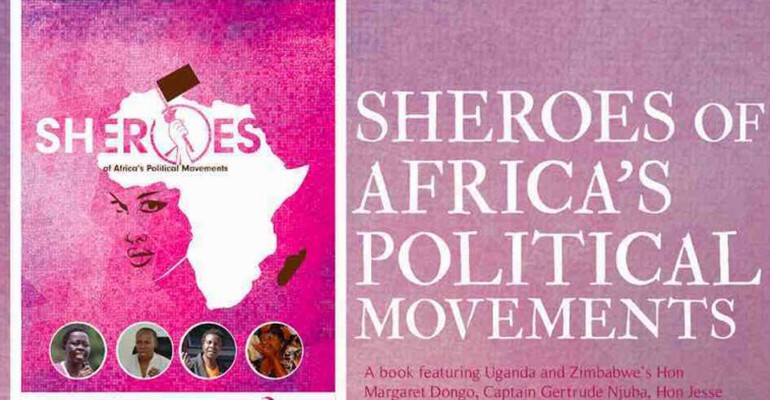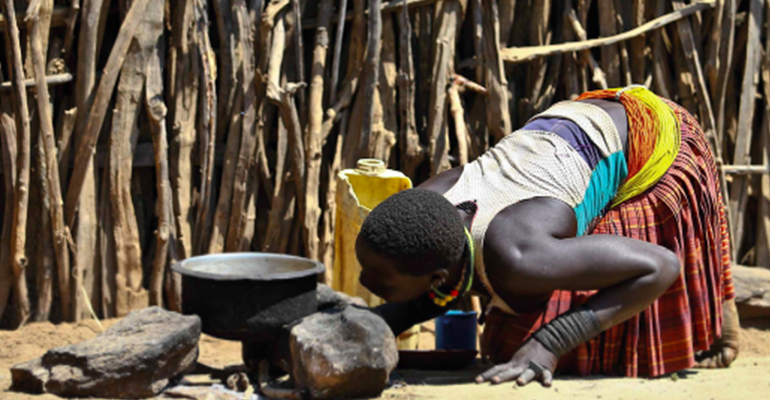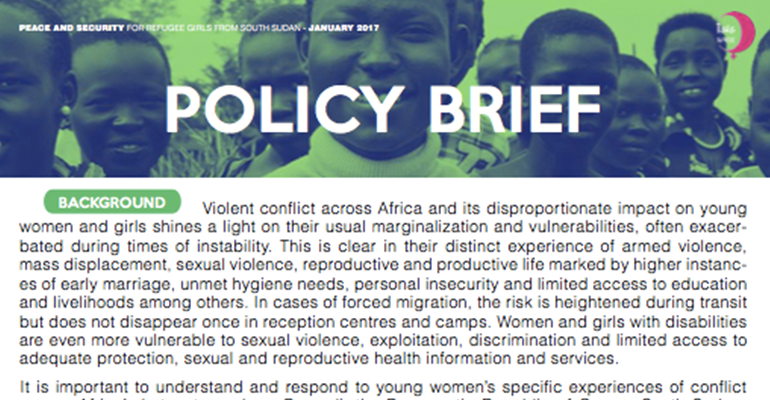To the Presidents of African States Parties to the International Criminal Court,
We write to commend your government for its membership and support for the International Criminal Court, and to encourage your government to offer greater support to the court in the wake of the withdrawals from the ICC by South Africa, Burundi, and Gambia.
In recent years, the ICC has come under significant attack. The inability of the ICC to have authority over crimes committed in some powerful countries and their allies is a cause of deep concern, even as claims that the ICC is targeting Africa are not supported by the facts.
A particular challenge is that the United States, China, and Russia have not joined the ICC, and they have blocked Security Council action to send crimes to the ICC that are committed in states that have not joined the court. Our organisations are committed to working to expand the reach of the ICC to ensure justice for serious crimes wherever they are committed.
Despite these challenges, the ICC has truly unique importance. The ICC is the only court that offers a potential check against impunity around the world when national courts fail to hold perpetrators to account. The court’s creation in 1998 represented a profound step forward in the fight against impunity, which African states fought to secure based on their own past experience.
The ICC’s docket also has begun to evolve. In January 2016, the ICC opened its first investigation outside Africa, into Georgia, and is conducting several preliminary examinations in countries outside Africa – including Afghanistan, Colombia, Palestine, and alleged crimes attributed to the armed forces of the United Kingdom deployed in Iraq.
The African Union in 2014 expanded the authority of the African Court of Justice and Human Rights to include crimes under international law, but it is a long way off from becoming operational. The protocol on expansion has yet to be ratified by a single government. In addition, immunity for sitting leaders under the African Court’s new authority runs counter to a core principle of the ICC’s mission to deliver justice for the gravest crimes: the irrelevance of official capacity before the court.
The ICC has an unprecedented role in the global landscape: it represents the hopes and aspirations for justice of the people governments represent. If anything, the ICC’s imperfections and the serious challenges it confronts are a reason for ICC members to work together and cooperate with the court to find workable solutions to achieve justice and accountability. Withdrawals from the ICC will frustrate the opportunities for accountability, and they will be felt most by victims who suffer violations and hope for the day justice can be done.
We believe the answer to the challenges for the ICC for some situations relating to Africa will not be found in abandoning the court and its efforts to bring justice to victims, but in having meaningful engagements between the ICC and African states and more active support for the court.
We thus respectfully request your government to consider: 1
- Publicly reaffirming your government’s commitment to remain an ICC member if it has yet to do so, encouraging other ICC members to do the same, and working with other governments to identify ways to best ensure the court has maximum backing in Africa during this difficult period. Such efforts will build on valuable comments signaling opposition to ICC withdrawal made over the last two weeks by the governments of Botswana, Malawi, Nigeria, Senegal, Sierra Leone, Tanzania, and Zambia.
- Engaging actively at the upcoming annual Assembly of State Parties to the ICC to provide support and exchange on the challenges the court faces—while respecting the court’s judicial independence—including by identifying other opportunities during the year where states can work to address tensions between some member states in Africa and the ICC in a principled manner.
- Striving to minimize unevenness and inconsistent action on justice for crimes under international law by backing a call for Security Council members to pledge to refrain from using their veto in mass atrocity situations and pressing for situations to be referred to the ICC by the UN Security Council that urgently demand justice, such as Syria.
- Calling for the immediate establishment of an ICC Liaison Office at the headquarters of the African Union in Addis Ababa to allow for more regular communication between the ICC and the AU to help to reduce misunderstanding and misinformation, and for consideration to be given to the establishment of any other ICC presences in Africa as helpful toward achieving this objective.
- Pressing for the ICC to have greater resources to expand its capacity to conduct investigations and rolex replica prosecutions and have impact in the communities that have been most affected by the crimes committed.
Your government’s support for the ICC is critical, particularly during this challenging period. Your efforts further would be timely with the ICC’s annual meeting of members taking place in The Hague from November 16 to 24.
We stand ready to support you and your governments in advancing the cause of justice. We appreciate your consideration of this letter.
Sincerely,
The following 200 organizations—which include more than 100 African civil society organizations based in more than 25 countries on the continent, 100 organizations specifically from the Democratic Republic of Congo, and several international organizations:
- Coalition Béninoise pour la Cour Pénale International
- Coalition Béninoise pour la Responsabilité de Protéger
- Forum Afrique Initiatives Droits de l’Homme et Développement (Benin)
- Institute for Advocacy in Africa (Benin)
- Réseau des Journalistes pour la Justice Internationale (Benin)
- DITSHWANELO – The Botswana Centre for Human Rights
- Amnesty International Burkina Faso
2
- Action des Chrétiens pour l’Abolition de la Torture au Burundi
- Association de Protection des Droits Humains et des Personnes Détenues (Burundi)
- Coalition Burundaise des Défenseurs des Droits Humains
- Coalition Burundaise pour la Cour Pénale International
- Forum pour le Renforcement de la Société Civile au Burundi
- Iteka (Burundi)
- Ligue des droits de la personne dans la région des Grands Lacs (Burundi, Democratic Republic ofCongo, Rwanda)
- Réseau des Citoyens Probes (Burundi)
- Coalition Centrafricain pour la Cour Pénale International
- L’Observatoire Centrafricain des Droits de l’Homme (Central African Republic)
- Chadian Coalition for the International Criminal Court
- Amnesty International Côte D’Ivoire
- Centre Féminin pour la Démocratie et les Droits Humains en Côte D’Ivoire (Côte D’Ivoire)
- Coalition Ivoirienne des Défenseurs des Droits Humains
- Coalition Ivoirienne pour la Cour Pénale Internationale
- Fondation Djigui (Côte D’Ivoire)
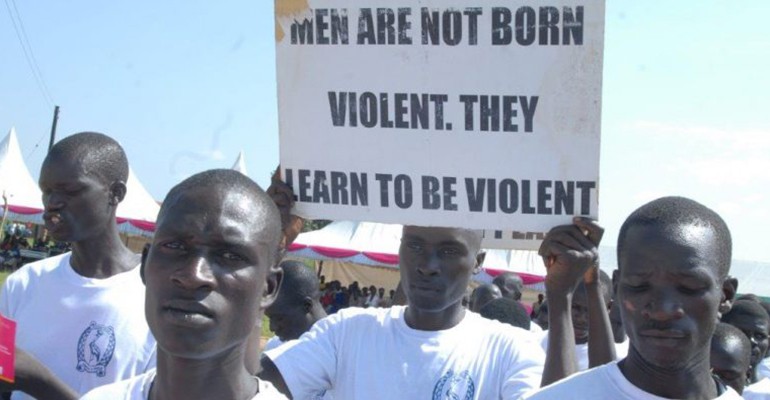
“Happy Wife, Happy Life” “Be a Real Man” “Woman is Human”. The start of the year gathered actors committed to advancing women’s rights and social change including government representatives (Ministry of Gender Labor and Social Development, the Ministry of Health and Uganda National Police) as well as civil society (Isis-WICCE, FIDA, CEDOVIP, MIFUMI Trocaire UJCC and UMWA).
Isis-WICCE joined these actors to contribute to a strategy being defined by CDFU partnering with UN Women to reduce social tolerance and acceptance for violence against women and girls in Kampala, Moroto, Kaabong, Pader, Kitgum, Gulu and Kamuli districts of Uganda. Identifying three key messages, the group targets women and girls between 10 to 35 years and boys and men between 14 to 49 years as well as a diversity of leaders.
Happy Wife, Happy Life, while focused solely on women, stresses that violence is not a pleasant experience for a woman and does not bring happiness to a household. Be a Real Man, premised on the idea that a man’s respect should be associated with positive attitudes and actions as opposed to violent masculinity. Woman is Human, addresses the negative perceptions within communities towards women and their humanity.
The conversation continues.
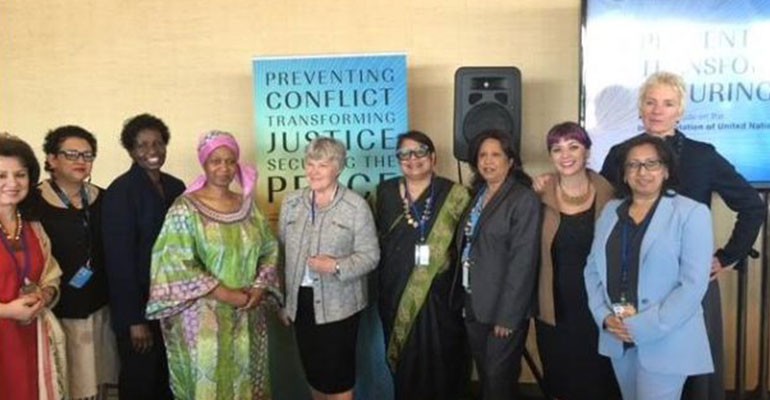
As the world marks 15 years of the UNSCR1325 on Women, Peace and Security, the UN United Nations Security Council held an Open Debate and a High-level Review Meeting to assess progress made at the global, regional and national levels and renew their commitments to the implementation of the resolution.
Coinciding with the review was the launch of the global study report entitled “Preventing Conflict, Transforming Justice, Securing the Peace: A Global Study on the Implementation of Security Council resolution 1325, commissioned by the UN Secretary-General in preparation for the 15th anniversary review. The report brings together research, which undeniably demonstrates that women’s empowerment and gender equality contribute to the conclusion of peace talks and sustainable peace, accelerating economic recovery, strengthening.
Isis-WICCE Executive Director is honoured to be a member of the High-Level Advisory Group on the global study. During the launch of the report, UNWomen Executive Director Phumzile Mlambo-Ngcuka, while sharing the highlights of the study stressed that ‘the greatest and most under-utilized tool we have for successfully building peace is the meaningful inclusion of women’. She further noted that the study found that women’s
In the spirit of renewing commitments and improving on the implementation of the resolution 1325, the Security council Security Council unanimously adopted Resolution 2242 (2015). Through the resolution, the Council decided to integrate women, peace and security concerns across all country-specific situations on its agenda. It expressed its intention to dedicate consultations to the topic of women, peace and security implementation; convene meetings of relevant Council experts as part of an informal experts group on women, peace and security, and invite civil society to brief during its country-specific considerations.
With this commitment, we hope to see increased meaningful participation and integration of women in peace processes for sustainable peace.

